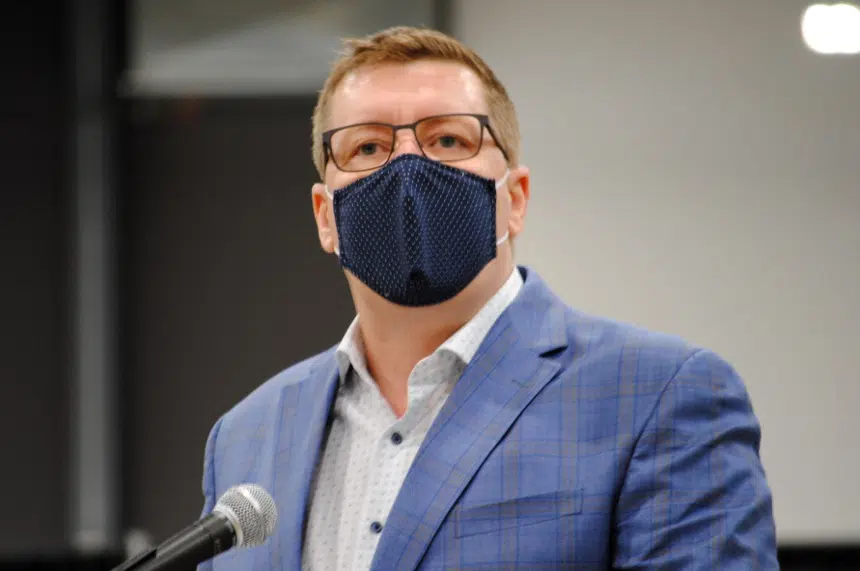Looking back on the past 12 months, Saskatchewan Premier Scott Moe said it has been a challenging year, but he’s staying positive.
“We’re making some headway with respect to COVID; we’re most certainly making some headway. We have some of the lowest active case numbers west of Nova Scotia, and that is due to what Saskatchewan people have done the last number of months,” said Moe.
The year before that was certainly up and down, starting with COVID-19 vaccines being ready and vaccination rates taking off, but then things started to change when the province was hit hard with the fourth wave.
Looking back, Moe said he doesn’t regret removing all restrictions in the province as of July 11, repeating the explanation that the decision was made with the information officials had at the time.
“I’d openly said that we should have moved a few weeks earlier with the measures that we put in place and I think as we look at how effective those measures have been, that is a fair assessment that I and many others have as well,” said Moe.
Moe admits the masking and vaccine policies that were announced in September were controversial.
“There are folks that feel we’ve gone too far (and) there’s folks that feel we’ve not gone far enough,” said Moe.
The Moe government didn’t want to implement a vaccine passport system at first, ministers for weeks talking about how they didn’t want to create a separation in society between vaccinated and non-vaccinated people.
But in the end, the government changed its tune, Moe now says, because it was necessary.
“Our hospitalizations — in particular our ICUs — were climbing and continuing to climb and action did need to be taken. I openly said that we likely should have moved a couple weeks earlier with those policies, so it was absolutely necessary and it’s necessary to have in place up to and including today,” said Moe.
Divisions in Saskatchewan have deepened over the year, particularly around COVID-19, and for the premier — who makes many of those decisions — those unhappy with the decisions have let him know. Moe said they have contacted him and his caucus directly and sometimes, much more directly and angrily, through social media.
“Some of that does come through social media channels. Much of it often is faceless and nameless and I think — as my grandmother always said — when you see that, you consider the source and you just leave it at that,” said Moe.
The premier said much of the negative criticism on social media comes from a very small percentage of the population.
“The vast majority of Saskatchewan people are quite understanding. They have their points of view … There is a loud and boisterous minority that will engage on social media and some of that can be nothing short of ugly at times, (but) some of it can be quite positive as well at times,” said Moe.
Moe said most of the people he has a chance to talk with in person or over the phone are much more understanding and respectful.
COVID-19 wasn’t the only thing Moe and his government had to face this year. Over the summer, the province, and much of North America, saw a terrible drought resulting in the largest crop insurance payout ever in Saskatchewan. But in dealing with it, Moe gives credit to the farmers.
“The drought that we had this year could have been much more of a disaster than it even was had they not been employing all of the innovation and agronomic techniques (and) the fertility programs that they have. They were able to squeak out in many cases every bushel that was available given the moisture that we had in many areas,” said Moe.
Saskatchewan also saw challenges around overdose deaths, with the province likely to hit a record number for the second year in a row.
Moe said overdose deaths are something the government is watching very closely, particularly in figuring out what it can provide when it comes to mental health supports for people in need and supports for their families as well.
The premier pointed to commitments his government has already made when it comes to increasing treatment beds.
“This is necessary, unfortunately, in this province that we have access to these types of programs, rehabilitation beds as well as a number of detox beds across the province,” said Moe.
Moe also talked about the urgent care centres being built in Regina and Saskatoon which will have immediate mental health and addictions supports. He said they’ll be a step forward in terms of continuity of services, but they’ll be a first step in something that will likely spread out over a numbers of years.
While the drought and its effect may still be a question in the coming year, the challenges around COVID-19 and addictions will likely be continuing theme in 2022.







